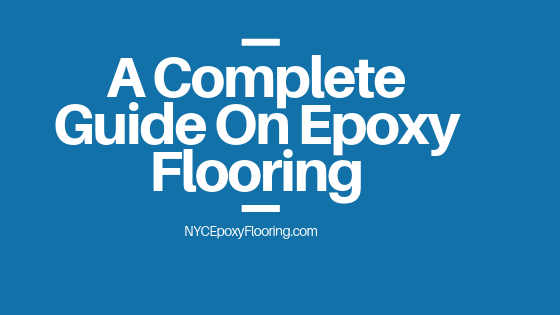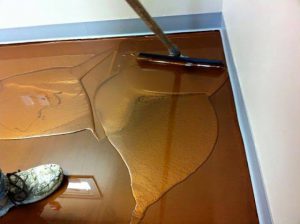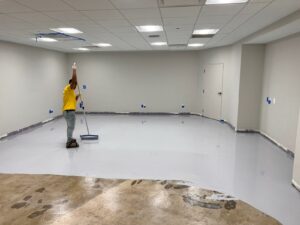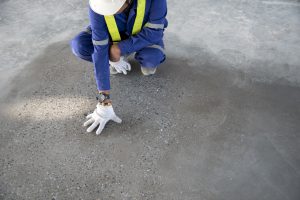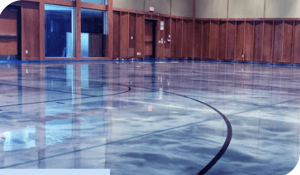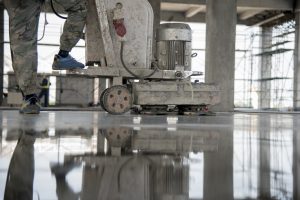Epoxy has become a recent trend in the market and by reading this article you can get some idea regarding the epoxy flooring. The content throws lights about the compositions, advantages, disadvantages, maintenance, cost, durability and other aspects of epoxy and everything you need to know about it.
If you want to learn more about Metallic Epoxy. you should check out complete Metallic Epoxy Guide.
What is Epoxy?
Epoxy is an amalgamation of organic elements. These are a chain of carbons components that are linked to other components such as nitrogen, hydrogen, oxygen, etc. This link occurs through a process of a covalent bond, and the elements share a paired electron to stay in an association. Let’s get into a bit wider concept of epoxy. It comes from an epoxide functional group which is comprised of atoms of carbon and oxygen. The functional group is therefore responsible for the characteristics and features of a molecule during a chemical reaction, the epoxide functional group of molecules reacts strongly to form a rigid yet very flexible material.
How does epoxy formation take place?
We can also relate the word epoxy with epoxy resin that emerges after the process of curing. The curing phenomenon takes place as soon as the epoxy materials are exposed to air, heat, or chemical additives. In the case of epoxy, curing takes place with the aid of a catalyst which is a chemical additive that speeds up the chemical reaction. A cross-linkage polymer is the result of the exothermic reaction. Epoxy owes its hardness and rigidity from the cross-linkages.
What are the benefits of epoxy flooring?
It is indeed a strenuous task to get a floor solution that withstands the abuse of time and yet serves to be an outstanding flooring option. One needs a stable ground to plant its feet and walk with confidence. Let’s get some insights into the benefits of flooring with epoxy.
Resistance
Epoxy floorings come with a major advantage of being resistant to every other thing like spills, gasoline, oil, cleansers, bleach transmission, etc. Additionally, they have a coating which is heat and water-proof. Therefore epoxy floorings become the obvious choice in garage and automobile industry. Hospitals and clinics also prefer epoxy since they are resistant to germs and infections and also it can be quickly sanitized.
Durable
Epoxy flooring is mainly incorporated in the heavy traffic areas like office, hotels, industries, hospitals, salons, etc due to their sturdy and hard nature. When installed over a concrete base epoxy floorings are converted into an exceptionally durable material.
Longevity
Another feature of epoxy floorings is that they are very long-lasting. Apart from its durability, they are selected mainly for their long lifespan. If these floorings are positioned properly then they can last for decades without any leakages or cracks.
Affordability
Epoxy flooring comes with a decent price tag compared to other flooring options. Installation charges are low since they can be easily placed over a concrete surface. Therefore price becomes a major driving factor in case of epoxy.
Low-maintenance
Epoxy flooring acts as a barrier to any kind of moisture, stains, liquids, and grease due to its non-porous nature. Now there is no need to add those carpets and grouts on the floor, as one swipe with a mop is enough to sanitize and clean your area. Maintenance becomes handy with epoxy.
Variety
Add decorative ideas to your floor with epoxy. Now you can give your personalized touch by including different colors from the palette, glitters, design elements, patterns, etc. You can customize it according to your choice and preference. The variety of choices makes it a convenient option to upgrade the look of your house or office at budget-friendly prices.
What is epoxy flooring used for?
We witness that epoxy floorings are mostly preferred in areas of loaded traffic like hotels, hospitals, industries, offices, salons, etc. Since it is a budget convenient option and can be installed with a variety of customization it is also becoming a choice in the residential sector. When the epoxy resin is coated on a concrete surface they become a durable, smooth and high performing and they last for several years without spending much on maintenance. To maintain standard hygiene and safety norms for workers and employees many commercial buildings, warehouses, industrial sites depend upon epoxy floorings. It can withstand heavy loads and pressure from machines and a rugged look can also be created through epoxy.
Is epoxy flooring durable?
Epoxy floorings are made from a coating of an adhesive mix that dries up super-hard and it is very difficult to make a dent, holes, cracks or fissure on it. It is also non- porous in nature for which it remains spills-proof to any kind of liquid like grease, stains, cleaner, liquid, etc. You can trust epoxy for the fact that it goes year after year without any wear and tear. They become extremely durable when they are placed on concrete surfaces. One can apply a coating of epoxy on a surface in layer after layer to make it very hard. The areas of heavy traffic include forklift, foot, and vehicle traffic but epoxy can withstand it and you do not need to lose the peace of your mind for that.
Are epoxy floors able to handle loads?
Epoxy floorings are even good with enduring heavy loads as well. There won’t be any dents or scratches from heavy machinery and equipment resting on these floors of commercial areas like airport hangers, hospitals and fire departments. Some customized epoxy floorings can even sustain the harsh environment of industries and warehouses were deep freezers are stationed. Drop or drag any material but epoxy floors won’t reflect any changes in their state.
What are the disadvantages of epoxy floors?
Earlier we have discussed the multiple advantages of epoxy flooring. However, every flooring has some disadvantages too. Let’s look at the problems of installing epoxy floorings:
Preparation: Getting your floor ready before installing epoxy flooring can be quite laborious. The concrete floors must be properly cleaned and it should get rid of any oil, grease, dirt, liquid before applying a layer of epoxy on the top. Multiple attempts are made to properly clean the place. Cracks or fissures if any must be filled as well.
Application: After cleaning it the next step is the application which is also time-consuming. It might take a few days for the first coat of epoxy to dry up hard before applying the second coat on top of it.
Smell: Epoxies emit a very strong and pungent smell when they are applied in a wet state. The hardener content is more in darker shades of epoxy compared to the lighter ones. They tend to ooze out a smell of ammonia after application.
Sensitivity: Epoxy floorings are prone to sensitivity. They should be applied appropriately according to the proper instructions and guidance provided. The coatings tend to come out easily if not done properly. Paints and oversprays are also hard to clean. Epoxy floorings are expected to be installed when humidity levels are low.
Moisture: Epoxy floorings don’t breathe and thus it becomes a huge problem if any moisture is trapped inside during the time of installation. When the moisture inside starts evaporating a bubbling or buckling in the floor appears which might call for the need to repair or refinish.
Removal: You cannot change the color or design once the epoxy coat is applied to the base. In such a situation you need to either repair it or remove the entire coating from the top which is quite costly, time-consuming, and difficult.
Is epoxy flooring safe for home?
Are you really worried that epoxy flooring is safe for or home or not? Well yes after its exposure and preferences in areas like industries and garages epoxies are making headlines for its use in the home as well. Two things should always be kept in mind before installing a layer of epoxy on your floor and ensuring safety. Whether the product has zero Volatile Organic Content (VOCs) and secondly is it made out of 100% solids. Epoxies with VOCs and 100% solids tends to emit harmful fumes for which respirator and other protective materials are required during installation. Now you can opt for Diamond Flooring that is a unique epoxy with zero VOCs and 100% solids in it. This is the safest option of installation for your future home as it is a completely odor free material.
How do you maintain an epoxy floor?
You require the least maintenance to keep your epoxy floors in a proper state. An important tip is that you need to apply a little bit of common sense when you are taking care of these floors.
If you want to learn more about maintaining of epoxy flooring, you can read this great guide.
Please remember that you should ask your epoxy floor contractor about special maintaining requirements.
The surface should be free from dust and grit
Over a while, if we don’t remove grit and dirt, it tends to accumulate and scratches will start appearing on the floor. It is advised that you should clean it regularly to get rid of dirt and grit. Even though epoxy floors are the toughest but if not cleaned then multiple scratches are developed over some time. Shop vacuum and soft brushes are the best tools for this purpose.
Say no to soap-based cleaners
Warm water and a good deck scrubbing brush or mop are just enough to clean the floors. Avoid using soap-based cleaners as they leave a haze over some time. For tougher spills take aid from soft soaps liquid cleaners.
Spot Cleaning
You want to spot cleaning it’s easy with a mop and warm water. Generally, epoxy floorings are water-resistant so any kind of dirt, grime, spills are easy to clean with one wipe.
Epoxy floors that are heavily soiled
It is very easy to clean heavily soiled epoxy floors. First, remove all the items and clear the surface congestion. Then carefully wipe the floor with warm water and a mop. In the second time, you can consider using 2-3 drops of clear ammonia mix.
Stains
Whenever you notice a stain, do not apply harsh steel scrubbers or strong chemicals like a comet that have high chances to corrode your epoxy floors. Chemical cleaning compounds with citrus or acid in them can break the catalyst and should be avoided. Instead, use a soft scrubbing brush with warm water to remove the stains.
Car chemicals, oils, and other chemicals
Whenever you see any car spill do not allow them to sit on the surface for a long period. Spills like engine oils are extremely hazardous as they react with chemicals of epoxy floors. Use shop towels or paper towels to remove the dirt and dispose of them in a proper place after use. Household cleaners, abrasive liquid, paints, etc should be instantly cleaned with a towel as they have very high chances of reaction with epoxy.
How much does it cost to epoxy the floor?
Mainly there are three types of epoxy floorings available in the market. First is the 100% solids epoxy that is expensive in comparison to the water-based epoxy and solvent-based epoxy. The water-based epoxy is thinner in consistency in comparison to the solvent-based epoxy. The solvent-based epoxy is used to cover up all those imperfections and they require the installers to use respirators while they are installing it. A gallon of water-based epoxy might cost around $30-$50 or more while a gallon of solvent-based or 100% solid epoxy might cost around $45-$150 or more. It will cost around $3-$12 a square foot if you hire a professional for installation. An area of about 250 square feet that is one car garage will cost around $750-$3,000 approximately. If you wish to save money then you can also prefer buying an epoxy floor kit and do it yourself at a cost $50-$600 or more, which depends upon the type of epoxy flooring you choose.
You should check the current prices for your unique needs, you can simply do that through our website for the following solutions: Garage epoxy floors, Commercial Epoxy Floors, and Industrial Epoxy Flooring.
Why is epoxy so expensive?
Epoxy floorings are not at all costly when compared to other flooring options. The price that is charged is completely justified since it provides durability, elongated shelf life, and non-porosity. Other floorings also come with their own set of disadvantages. If compared, the pros are more in epoxy than the cons. We must also assess the condition of the subfloor on which epoxy is going to be installed. A damaged subfloor must be repaired first. Therefore the cost can rise in this case. You can also customize them with your ideas of colors, designs, patterns, etc. However, if want to add the 3D art effect than it can fetch a higher price tag. At this point, you can say that epoxy flooring installations are a bit expensive.
How will you apply epoxy?
We must be well aware of the fact of how to apply epoxy. For this, you need to prepare the area, have the tool kits and equipment, and proper products to get set go. There are various ways of epoxy application which mainly depends on the type of epoxy we are using and the purpose we are using it. Some epoxy can simply be used as paint. For that, you need a roller or paintbrush and get the work done. In the case of a bar or tabletop pour the epoxy and trowel it while an epoxy grout can be applied as a regular grout. Read the instructions very carefully before proceeding with the final application. Remember that different epoxy floors require different methods.
What tools and products you require for the application of epoxy?
The primary requirements for the application are products that are, the epoxy of your choice, primer, and skin clothing. To add a touch of customization you can include color mix, glitters, flakes, stones, etc. A set of equipment for application purposes like the trowels, mixer, bucket, roller, paintbrushes, mixing cups, and cleaning supply are required to initiate the process. Make sure to clean and get rid of any kind of additional dirt, grit or debris before spreading the first layer of epoxy on the floor. If the left out impurities are present on the surface it becomes a permanent part of the epoxy. Prepping the area before using epoxy is considered to be vital. Try to Diamond Grind your floor and transform it into a CSP3 profile before applying Epoxy.
What are the precautions needed during the epoxy application?
To add strength and viability to the floor you can go with the second layer of epoxy but in a hurry don’t apply the second coat before the curing time of 24 hours. After 48 hours there is no use in applying the second coat. Be alert and take precautions when you are using epoxy. The resin mix of epoxy dries up to be a very hard substance so prevent your skin and clothes from it. Direct contact with the skin can create irritations and infections. Therefore use an apron or coverall while dealing with epoxy.
Conclusion
An Epoxy is an excellent tool that can be incorporated into a plethora of projects mainly because it’s durable, low- maintenance and cost-effective features. Not only in flooring, but they can also be molded and used in other mediums such as tabletops, counter-tops, fireplaces, bars, backsplashes, etc. Even you can fix problems like your damaged floors, leakages, cracks, holes with the hard adhesive-resin solution of epoxy. Epoxy has become the premium choice because of its convenient features.

